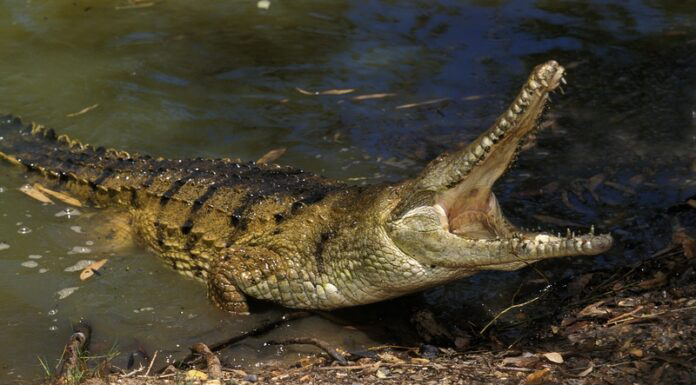A 53-year-old man, father to four children, was killed during a crocodile attack while he was bathing with family members in the Bulete River in South Sulawesi, Indonesia, on Thursday afternoon, August 14. The victim, Arifuddin, was grabbed by the crocodile around 6 p.m. local time when the animal emerged from the water and bit his leg.
The attack was recorded on video, showing Arifuddin reaching toward the riverbank with one arm while struggling to stay above water as the crocodile maintained its hold. Several villagers entered the water in an attempt to save him, but he disappeared underwater before they could reach him.
Emergency services from Wajo Regency responded to the incident. Rescuers later saw the crocodile with the victim’s body in the muddy waters but were initially unable to retrieve it. The crocodile stayed in the area for several hours, swimming in circles before settling on a riverbank about one mile from the attack site.
Jerry Saputra from the Pitumpanua Sector Fire Rescue Team confirmed the sequence of events. “Initially, the victim was bathing with his relatives,” Saputra stated, noting that the attack became evident when Arifuddin’s screams alerted his family members to the danger.
Local residents created a makeshift snare to bring the crocodile closer to the shore in an effort to recover the body. They eventually managed to drive the crocodile away by throwing rocks, allowing them to retrieve Arifuddin’s body for his family.
Community members expressed surprise at this incident, as the Bulete River is often used for bathing and washing clothes. They noted that the river was not previously considered a habitat for crocodiles, making the attack unexpected.
Indonesia is home to 4 species of crocodiles, including large estuarine crocodiles that thrive in the country’s tropical climate. Environmental experts suggest that overfishing and the destruction of coastal habitats for agriculture have pushed these animals further inland in search of food.
Tin mining activities have also brought human populations closer to crocodile areas, raising the probability of dangerous encounters between people and wildlife. Many rural communities continue to rely on rivers for daily activities such as bathing and fishing, increasing the risk of attacks.
This incident is part of a broader trend of increasing crocodile attacks in Indonesia. In April, another father was killed in a similar incident when a crocodile grabbed him and dragged him into the water while his friends were unable to save him. Sarangadi, 49, died despite rescue efforts.
In March, a 10-year-old boy named Fikri Qurniawansyah was killed by a crocodile in Riau province while playing in a river. The child was on a makeshift canoe with friends when the attack occurred.
Additional incidents took place in July, including attacks on a schoolboy and a grandfather. One video showed a crocodile carrying the boy’s body after he went fishing, and another captured a grandfather being dragged by a crocodile in Tanggamus Regency while bathing in a river.
The combination of environmental degradation, habitat destruction, and human encroachment into crocodile territories has contributed to the rise in attacks, according to experts. Overfishing has reduced food supplies in traditional crocodile habitats, while coastal development has eliminated key ecosystems where these reptiles once thrived.








